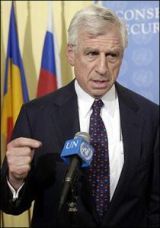US accuses Sudan govt, Darfur rebels of ignoring agreements, complicity in desaster
By EDITH M. LEDERER, Associated Press Writer
UNITED NATIONS, Dec 7, 2004 (AP) — The United States on Tuesday accused all parties in the 22-month conflict in Sudan’s western Darfur region of complicity in a growing humanitarian disaster and demanded that those responsible be held accountable for atrocities and attacks on civilians.
 U.S. Ambassador John Danforth (photo) said the Security Council has refused to consider sanctions, but he called for deployment of the full 3,300-strong African Union force to Darfur and said the council should consider sending an even larger force as well as international police and 50 additional human rights monitors.
U.S. Ambassador John Danforth (photo) said the Security Council has refused to consider sanctions, but he called for deployment of the full 3,300-strong African Union force to Darfur and said the council should consider sending an even larger force as well as international police and 50 additional human rights monitors.
“We’re getting nowhere,” a frustrated Danforth said after the council was briefed on Secretary-General Kofi Annan’s latest report on Darfur which warned of looming chaos as violence increases, order collapses, and the number of desperate people in need of humanitarian aid reaches nearly 2.3 million, .
“The report that we had today was extremely troubling,” Danforth said. “Both sides, the rebels and government and the militia, all sides, are complicit in the disaster. They sign agreements which apparently mean nothing at all. This remains a very serious situation.”
Undersecretary-General for Political Affairs Kieran Prendergast, who briefed the council on Annan’s report, said the international community must send an unequivocal message to the Sudanese government and rebels that hostile military actions are unacceptable and must stop.
He said the rebel Sudan Liberation Army “is thought to be responsible for instigating much of the violence, although it has denied this.” The government’s use of aerial bombing to retaliate, if confirmed, would also violate a Nov. 9 accord, he said.
The African Union has so far deployed 800 troops and 100 observers to monitor the situation in the vast, mainly desert region. Prendergast praised its “robust approach” to get the parties to comply with their commitments to end the conflict, which has killed over 70,000 people.
After the meeting, Algeria’s U.N. Ambassador Abdallah Baali, the current council president, said members expressed “deep concern about the recent escalation of violence … and the negative impact” on the civilian population.
Council members called on all parties “to cease all acts of violence and to respect and implement their commitments and implement Security Council resolutions,” he said.
At a Nov. 25-26 meeting in Chad to discuss the latest violence, the African Union reported approximately 40 cease-fire violations by both sides since mid-August.
It criticized both sides and demanded that the government submit plans and timelines to neutralize the Janjaweed, an Arab militia and other armed fighters and that the two rebel groups submit information on the locations of their forces within the next few weeks.
The African Union warned that failure to do so would oblige it to refer the matter to the U.N. Security Council, the report said. The council has raised the possibility of sanctions, without using the word.
“As you know, we’ve been going round-and-round with respect to any penalties that would be imposed, to the point of not even using the word sanctions in previous resolutions. So that obviously is very, very controversial,” Danforth said.
But the U.S. position “is that those who engage in atrocities and attacks on civilians must be held accountable by the international community,” he said.
The Darfur conflict, which the United Nations describes as the world’s worst humanitarian crisis, began in February 2003 when the Sudan Liberation Army and allied Justice and Equality Movement took up arms against what they saw as years of state neglect and discrimination against Sudanese of African origin.
The government responded with a counterinsurgency campaign in which the Janjaweed has committed wide-scale abuses against the African population.
